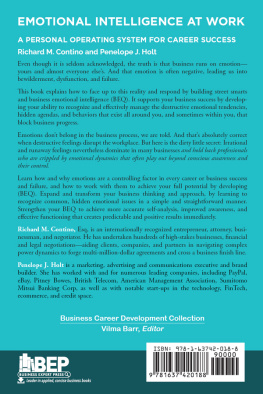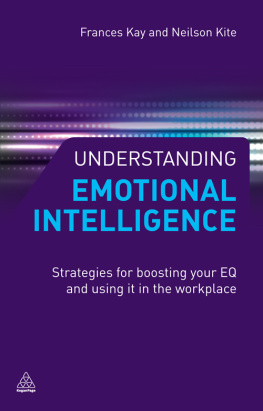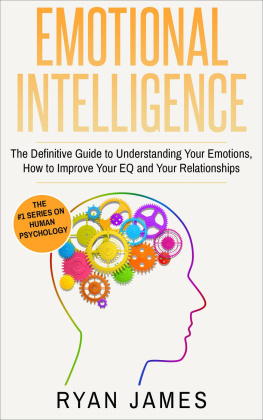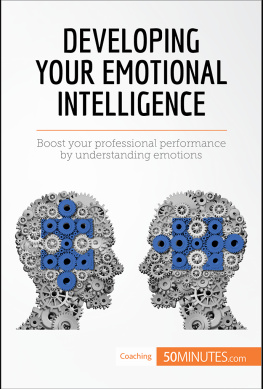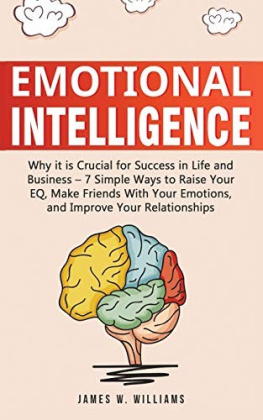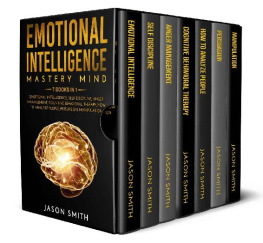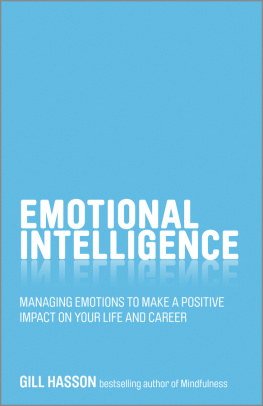Table of Contents
Guide

Emotional Intelligence at Work
Emotional Intelligence at Work
A Personal Operating System for Career Success
Richard M. Contino and Penelope J. Holt

Emotional Intelligence at Work: A Personal Operating System for Career Success
Copyright Business Expert Press, LLC, 2021.
Cover design credit: Charlene Kronstedt
Interior design by Exeter Premedia Services Private Ltd., Chennai, India
All rights reserved. No part of this publication may be reproduced, stored in a retrieval system, or transmitted in any form or by any meanselectronic, mechanical, photocopy, recording, or any other except for brief quotations, not to exceed 400 words, without the prior permission of the publisher.
First published in 2021 by
Business Expert Press, LLC
222 East 46th Street, New York, NY 10017
www.businessexpertpress.com
ISBN-13: 978-1-63742-018-8 (paperback)
ISBN-13: 978-1-63742-019-5 (e-book)
Business Expert Press Business Career Development Collection
Collection ISSN: 2642-2123 (print)
Collection ISSN: 2642-2131 (electronic)
First edition: 2021
10 9 8 7 6 5 4 3 2 1
For Matt, May, and Sue
Description
Even though it is seldom acknowledged, the truth is that business runs on emotionyours and almost everyone elses. And that emotion is often negative, leading us into bewilderment, dysfunction, and failure.
This book explains how to face up to this reality and respond by building street smarts and business emotional intelligence (BEQ). It supports your business success by developing your ability to recognize and effectively manage the destructive emotional tendencies, hidden agendas, and behaviors that exist all around you, and sometimes within you, that block business progress.
Emotions dont belong in the business process, we are told. And thats absolutely correct when destructive feelings disrupt the workplace. But here is the dirty little secret: Irrational and runaway feelings nevertheless dominate in many businesses and hold back professionals who are crippled by emotional dynamics that often play out beyond conscious awareness and their control.
Learn how and why emotions are a controlling factor in every career or business success and failure, and how to work with them to achieve your full potential by developing (BEQ). Expand and transform your business thinking and approach, by learning to recognize common, hidden emotional issues in a simple and straightforward manner. Strengthen your BEQ to achieve more accurate self-analysis, improved awareness, and effective functioning that creates predictable and positive results immediately.
Keywords
Emotional intelligence; career development; business success; career success; corporate politics; building career confidence; business agendas; business failure; business challenges; business strategies; business relationships; business mistakes; success strategies; business self improvement; workplace dysfunction; overcoming career obstacles; manipulative people; unhealthy corporate culture; business agendas; overcoming failure; difficult bosses; destructive coworkers; office politics; work failure and success; career coaching
Contents
If youre not where you want to be in business, this book has the answer. Its a guide to building street-smarts and Business Emotional Intelligence (BEQ)the ability, or operating system to recognize and manage effectively the challenging or destructive emotional tendencies, hidden agendas, and behaviors that emerge in the business environment.
Why is it critical that you apply yourself to building BEQ? Because, contrary to what we are routinely advised, business runs on emotionyours and almost everyone elses. And that emotion is often negative, leading us into bewilderment, dysfunction, and failure.
Weve all been told in countless ways that emotionsour feelingshave no place in the business process. And thats absolutely correctat least to the extent that emotions are destructive to business and the people involved. But here is the dirty little secret, rarely if ever touched upon in business schools, and never fully acknowledged or discussed by professionals: Business and its participants are held back, and sometimes totally crippled, by irrational and destructive feelings. Feelings that are often not only completely out of our conscious awareness, but at times completely out of our control.
Its no wonder then that success and satisfaction are so elusive, when all of us have a hand, by ignoring emotional dynamics, in unknowingly dynamiting our progress, and the progress of the business were inevery step of the way.
How did we get into this predicament? Simplewe were duped. By our teachers. By our mentors. By our parents. By the business community. Quite unintentionally, in most cases. They, along with societys rhetoric about business in general, have virtually brainwashed us into believing that business is an unemotional endeavor whose sole objective is to achieve profit and growth for the organizations and people involved. As a result, we typically assume emotional issues, particularly destructive ones, are not in play. A critical mistake. The truth is that emotions underlie and control virtually every aspect of business success or failure.
This book explains how and why emotions are a controlling factor in every career or business success and failure, and how you must work with them to achieve your full potential by building (BEQ). In fact, this book will expand and transform your business thinking and approach. It will guide you through common, hidden emotional issues in a simple and straightforward manner. Youll learn valuable concepts in developing BEQ, awareness, self-analysis, and effective functioning, so you can achieve predictable and positive results immediately. You will gain a competitive edge in business and will no longer be an unwitting victim of office politics, manipulation, or self-destructive behaviorsyour own and other peoples.
What Is Emotional Intelligence in Business?
The concept of IQ or intelligence quotient is well understood. A set of standardized tests measure aspects of visual-spatial and auditory processing, as well as short-term memory and processing speed, to define a persons ability to solve problems across a range of tasks. We think of high-IQ individuals as smart problem solvers whose abilities we can measure.
But what about emotional intelligence or EQ? In the last couple of decades, thinkers and writers including, most famously, Daniel Goleman, the author of Emotional Intelligence, have explored why some people are gifted at managing the dynamics of interpersonal relationships and demonstrating emotional maturity, in their work and personal lives. Goleman and others identify traits that might define an individual as emotionally intelligent.
There is push-back, however, from the field of psychology. EQ, we are advised, is not a psychometrically valid concept. Insofar as it is anything, some psychologists suggest, it represents the Big Five trait agreeableness. Agreeable people are compassionate and polite, but they can also be pushovers. Disagreeable people, on average (if they arent too disagreeable) make better managers, because they are straightforward, dont avoid conflict, and cannot be easily manipulated.
Its clear that clinical psychologists are staking out and protecting their turf, from what they consider to be pseudo-science, to uphold the integrity of psychometry, or the well-established science of measuring human traits and personality. But regardless of whether social scientists and psychologists approve of how EQ is conceptualized and measured as an aspect of human personality, it nevertheless continues to be a popular concept in mainstream culture that most people understand intuitively.

